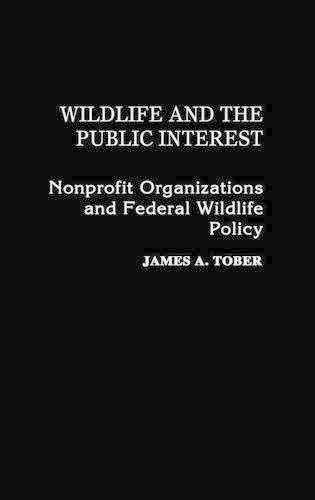
Wildlife and the Public Interest: Nonprofit Organizations and Federal Wildlife Policy
(Hardback)
Publishing Details
Wildlife and the Public Interest: Nonprofit Organizations and Federal Wildlife Policy
By (Author) James A. Tober
Bloomsbury Publishing PLC
Praeger Publishers Inc
10th January 1989
United States
Classifications
Tertiary Education
Non Fiction
333.95160973
Physical Properties
Hardback
232
Description
Tober considers the activities of nonprofit organizations that attempt to influence public policy dealing with wildlife. The author favors those organizations interested in preserving such wildlife, rather than those that foster hunting or that assess the value of wildlife in the context of economic development. Tober provides sketches of the makeup of the various organizations covered, the constituents they serve, their budgets, and the means they use to influence public policy. The author focuses particularly on the late 1970s and the 1980s, and uses the controversies over preserving the California condor and the bobcat as case studies. Choice Our relationship with the millions of other species with which we share this earth is institutionalized by many organizations, some of which seek to influence policy in the wildlife arena. Wildlife and the Public Interest is a study of this complex wildlife industry, examining the structure, conduct, and performance of those involved. It studies the extreme complexity of the policy process with regard to the relationship between humans and wildlife. A special focus in this book is on the role of nonprofit organizations that have come to dominate large segments of the industry. Students and scholars of public policy, or environmental and resource policy, as well as the general reader interested in this important topic, will find Wildlife and the Public Interest an invaluable resource. The book begins with a characterization of current wildlife policy. Further chapters discuss the wildlife industry; What is wildlife How do we interact with it What sort of organizations exist in the interest of wildlife Two current case studies--of the evolution of the controversial captive breeding program for the California Condor and of the regulation of harvest and export of the bobcat--explore the complexities of policy making and the range of nonprofit activity. Finally, the book examines the community of nonprofit organizations in an interorganizational setting.
Reviews
. . . Tober's book makes a valuable contribution to the developing field of wildlife policy literature.-Natural Resources and Environmental Administration
Tober has served as a visiting professor in nonprofit organizations and public policy at Yale. His previous works include Who Owns the Wildlife. In his latest book, Tober considers the activities of nonprofit organizations that attempt to influence public policy dealing with wildlife. The author favors those organizations interested in preserving such wildlife, rather than those that foster hunting or that assess the value of wildlife in the context of economic development. Tober provides sketches of the makeup of the various organizations covered, the constituents they serve, their budgets, and the means they use to influence public policy. The author focuses particularly on the late 1970s and the 1980s, and uses the controversies over preserving the California condor and the bobcat as case studies. The book includes a selected bibliography, an adequate index, and tables that outline the founding dates, scope of interests, and constituencies served by these organizations. For college and university libraries with collections on environmental studies and public policy.-Choice
." . . Tober's book makes a valuable contribution to the developing field of wildlife policy literature."-Natural Resources and Environmental Administration
"Tober has served as a visiting professor in nonprofit organizations and public policy at Yale. His previous works include Who Owns the Wildlife. In his latest book, Tober considers the activities of nonprofit organizations that attempt to influence public policy dealing with wildlife. The author favors those organizations interested in preserving such wildlife, rather than those that foster hunting or that assess the value of wildlife in the context of economic development. Tober provides sketches of the makeup of the various organizations covered, the constituents they serve, their budgets, and the means they use to influence public policy. The author focuses particularly on the late 1970s and the 1980s, and uses the controversies over preserving the California condor and the bobcat as case studies. The book includes a selected bibliography, an adequate index, and tables that outline the founding dates, scope of interests, and constituencies served by these organizations. For college and university libraries with collections on environmental studies and public policy."-Choice
Author Bio
JAMES A. TOBER teaches economics at Marlboro College, Vermont, and is affiliated with the Program on Nonprofit Organizations at Yale University. He is also the author of Who Owns the Wildlife (Greenwood Press, 1981)
